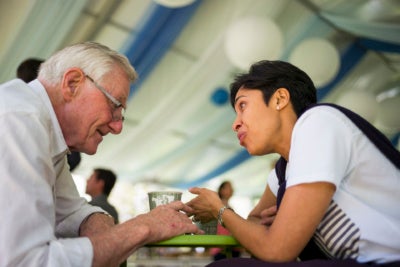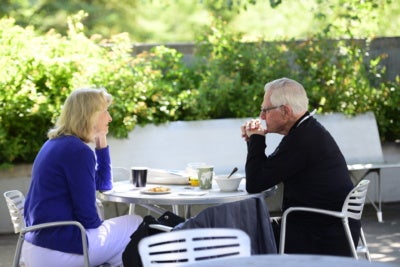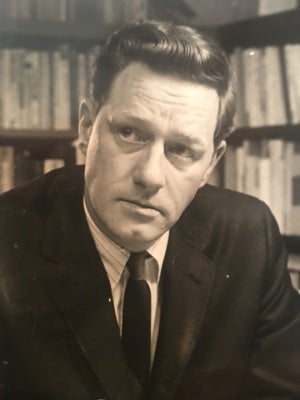As the founding executive director of the Henry Crown Fellowship Program and a senior moderator of the Aspen Institute, Keith Berwick has moderated hundreds of seminars and has been a role model to many classes of Fellows over the years. He has a special ability to bring groups together — helping those who come from different backgrounds and hold opposing views to see the common humanity in each other. In this piece, Keith reflects on the boundaries people create through the idea of “the other” and how he has worked to move past them, starting with “the other” in himself.
I have spent much of my life grappling with the problem of Otherness, the ways in which we set up barriers between ourselves and others based on real or imagined distinctions of race, gender, sex, wealth, class, education, color, age, and religion. The list is practically endless: invidious distinctions based on a supposed hierarchy of values sanctioned by centuries of law, custom, and tradition and reinforced by the dynamics of wealth and power.

Long-time friends and moderators Keith Berwick and Heather Sonn.
This hierarchy is now being challenged by the gratuitous inequity imposed on those defined as the Other. Who are they? Who does the defining? As Simone de Beauvoir points out in “The Second Sex (1994), it is men who make the rules. They always have, at least since Adam and Eve. “Thus humanity is male and man defines woman not in herself but as relative to him; she is not regarded as an autonomous being.”
So to begin with, women, a majority of the world’s population, are defined as Other, no matter their aspirations and accomplishments. And from an American perspective, given the legacy of European colonization, immigration, and race-based slavery, African Americans, Latinos, Asian Americans, Native Americans, and indeed all people of color, are defined as other – not like us, different, lesser.
Otherness, then, is defined from a position of power and privilege and experienced as oppression. That was my experience of it as a child growing up in Toronto in an outwardly respectable but internally dysfunctional family at the hands of my older brother who bullied me mercilessly, twice tried to kill me, and ultimately committed suicide in Golden Gate Park, San Francisco, when he was 19 and I was 17. The news of his death reached us on Halloween 1945.
When I read Jorge Luis Borges’s haunting story, “The Other,” it resonated with me immediately. I saw myself in analogy to the author, who depicts himself sitting alone on a bench beside the Charles River when a young man unexpectedly sits next to him. It turns out that this is an apparition of himself as an adolescent in Geneva some 50 years before. Borges, a sexagenarian, embarks on a dialogue with his younger self, trying to bridge the gap between the two. He recalls many details from his earlier life, including a sexual initiation planned by his father that apparently traumatized him, but he can’t connect. Yet the images are vivid in his mind. It is eerie. The past seems more real than the present. The reader is led to reflect on the potency of memory, the power exerted by absent things.

Keith and an Action Forum participant in 2016.
We introduced Borges’ “The Other” into the Aspen Seminar curriculum in 2005. Our thought was that it would provide an opportunity for seminarians, who by definition come from positions of power and privilege, to experience the process of Otherness through personal introspection.
I first moderated the piece in the fall of 2005, at an Executive Seminar attended by Mehrdad Baghai and Bill Patterson, members of the Infin8 Cass of Henry Crown Fellows. The discussion was lively, thoughtful, and compelling. Several people shared stories of their own encounters with shadow selves, nuggets of self-reflection that served to enrich the dialogue.
After the session Bill Patterson asked me what I had been doing when I was his age.* I replied that as an academic historian I was doing research and teaching, a very different sort of life from the entrepreneurial endeavors of Aspen Fellows. But as I reflected further I realized that at Bill’s age I was actually at a major inflection point — deciding to leave the academy to lead a humanistic repertory company on a three-year tour of small communities discussing the legacy of the American Revolution in the run-up to the 1976 bicentennial. It proved to be one of the most illuminating periods of my life, a window into the lives of real people trying to realize the promise of the Declaration of Independence.
Forgiving the unforgivable — a monumental challenge of our time — provided a path to renewal.
— KEITH BERWICK
Under the stimulus of Borges’ story and Bill Patterson’s inquiry, I began the practice of revisiting critical incidents in my earlier life to see what I could learn, starting with the fateful Halloween when we received the news of my brother’s death, which I had experienced as a liberation from tyranny. As I sat there alone I faced a bitter truth, that my brother was not gone. I had carried him as a shadow presence within because I had never forgiven him. So began an arduous process of forgiveness. In an old box I found an artist’s sketch of him done just days before he died. His eyes carried his pain. I saw not the tyrant of my childhood memory but a sick, tormented boy. In time I was able to find it in my heart to forgive him, and to forgive myself for my triumphalism at the news of his death. Forgiving the unforgivable — a monumental challenge of our time — provided a path to renewal.

Keith Berwick in the 1960’s.
My practice now is to test the degree of alignment between my inner and outer self. So, for example, I have acquired a refreshing new view of old adversaries. I have realized that bêtes noires provide important clues to my own failings. Some have become veritable spirit guides helping keep me from repeating past mistakes.
Then there is the matter of trust. Whom can you trust? To gain trust you must first trust yourself, prove yourself trustworthy, and then extend your trust to others. When we gather in circles of trust in our seminars, the authenticity of our exchanges is palpable. Our dialogues teach the importance of kindness, empathy, compassion, and love as crucial attributes of enlightened, effective leadership.
Now as I enter my tenth decade, I find myself re-examining the fundamental assumptions that have guided me thus far. The world seems to have turned itself inside out and upside down. I believe we are at a point where it is no longer possible to entertain the fictions that govern so many of our actions. We must begin to see the world anew. We must cease being Other to each other.
*Sadly, Bill Patterson, one of the best human beings I have ever known, died tragically early from a brain tumor in 2010, at the age of 48.